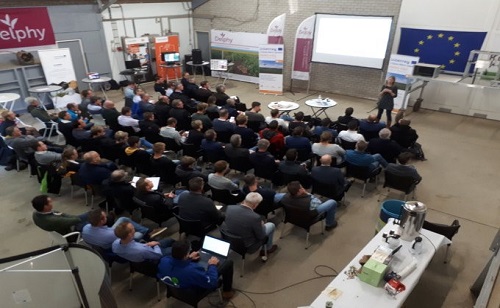Delphy host INNO-VEG network launch meeting
05 November 2019 by Admin

After the welcome and introduction by Charlotte van der Sluijs, secretary-director of the Rusthoeve Research Centre, project lead Lizzie Sagoo (Principal Soil Scientist, ADAS from the UK) described how the INNO-VEG project is developing innovative methods for carrying out research into field vegetables and potatoes.
This year, a programme of 48 field experiments has been set up in the UK, France, Belgium and the Netherlands to develop an overarching protocol for integrating crop sensing data into field research methodologies. Jean-Pierre Cohan, Head of department for Crop physiology, biotechnology and crop phenotyping at Arvalis (France) presented some early results from these experiments. The project includes experiments on potatoes, onions, leeks, Brussels sprouts, carrots, cauliflower, cabbage, lettuce, spinach, courgettes and vining peas.
In the lecture 'Smart Farming, use potential to raise profitability’, Herman Krebbers from Delphy gave his view on the current state of the art for precision-agriculture. Although many farmers now use precision farming technologies such as GPS, Krebbers said most are not yet making the most of the technology to get value for their farms. Many farmers already pay for soil EC scans or crop sensing data. A lot of additional data such as digital elevation maps and satellite images can be obtained free of charge online. The tractor also offers data, such as tractive power and fuel consumption. By combining the available data, task maps can be made and used for various purposes, such as variable sowing or planting, variable fertiliser or lime application and variable spraying of herbicides.
The meeting was concluded by Cor van Oers (Delphy) who explained the aims of the INNO-VEG innovation network. The cross-border network aims to increase the speed and acceptance of innovation in the field vegetable and potato sectors through cooperation and the exchange of knowledge between the technology industry, research organisations and the field vegetable and potato sectors. The network is free to join and anyone who is interested can register to join online. Members can add their profile to the members directory and add information on relevant services or projects to the website. A web-based innovation hub provides a forum for members to engage with each other, post updates and ask questions.
The results from the INNO-VEG field experiments will be disseminated via the network's website. The network will also organize additional networking meetings in the UK, the Netherlands, France and Belgium over the next two years.
Information
X



